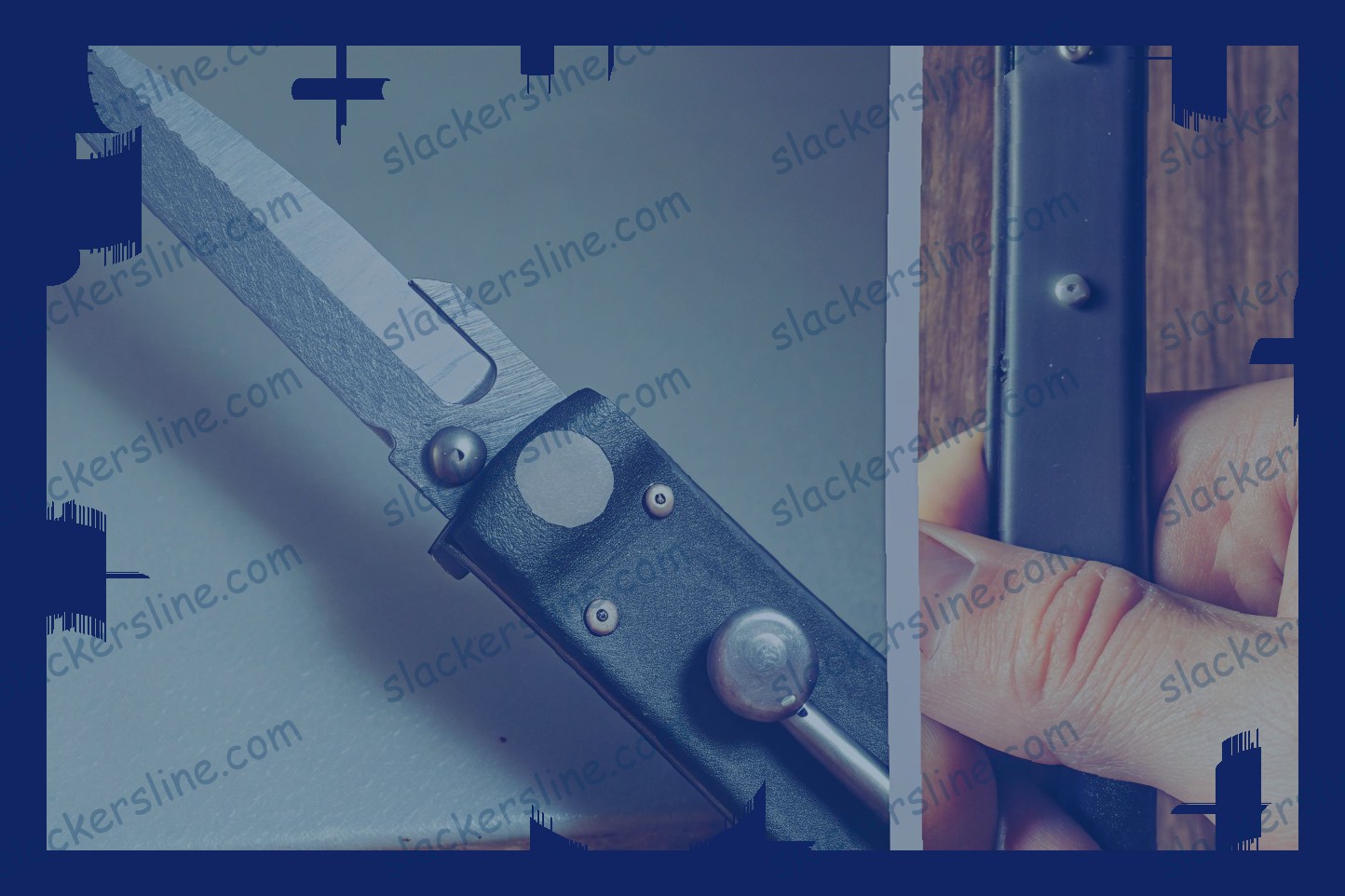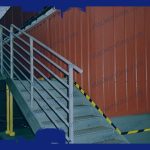OTF Knives Explained
OTF knives, or Out-The-Front knives, are a type of folding blade knife that do not fold in the traditional sense. The blade of a true OTF knife is housed in a protective cavity or sheath and is released by a push button located at the end of the handle. Upon pressing the button, the blade flies out through a slot near the other end of the handle, similar to a garage door opening. In order to retract the blade, the user must press down on another mechanism to close the knife.
In Utah , the push-button design of an OTF knife is what commonly gets it into legal trouble. These knives are often classified as switchblades, an automatic weapon illegal to own in some states. Utah gun laws, however, are more relaxed than those of some neighboring states. Considered a folding knife under Utah gun laws, switchblades are legal to carry if they are less than four inches long. Utah permits more than other states when it comes to travel regarding the possession of knives.

Knife Laws in Utah
The state of Utah has very permissive laws when it comes to knife ownership and use. The law isn’t particularly complicated here, either; you’re free to own any kind of knife you want, be it folding, fixed blade, bowie, machete, or utility knife. Be advised, however, that while the law may allow you to carry just about any type of knife, there is a distinction between "carry" and "conceal" when it comes to knives in this state.
When it comes to carrying knives, Utah law states that you may carry "openly" and in a "place where the knife is not prohibited." While the law doesn’t give us a list of "places where the knife is prohibited," we’d argue that ‘openly’ means you can’t put the knife in your pocket and ‘places where the knife is prohibited’ means you can’t carry it in public. What we’ve arrived at here, then, is that you can carry a knife in Utah anyplace in your home or office, so long as it is done openly and without any kind of cover. You can obviously legally own and carry any sort of knife in these places; be they folding, fixed-blade, dagger, stiletto, thrower, Dirk, dirk, scabbard, poniard, or setting knife – and that’s without going into utility knives for contractors, which are also legal.
As far as the carrying of knives concealed, or hidden, Utah law states that you are free to do so provided that knife is one that is a "dirk, dirk knife, straight-edged knife, including a razor, or a razor blade whether or not in a housing." Basically, if your knife has a blade that is 4 inches or longer and locks open, whether it be by yourself or conveniently with a flick of the wrist, it is legal for you to carry it, concealed, when you go out in public.
Present Status of OTFs in Utah
The state of Utah has liberal laws around knife carries, and this certainly applies to OTF knives. There are no major restrictions on everyday carry of OTF knives, but there are some laws to keep in mind. As with so many states and cities, public perception can become a law when certain political groups push their agenda. So even though you might legally be able to own and carry OTF knives in Utah, you should think long and hard about the message you would be sending to people who see them.
Based on my research, nothing new has recently been passed or opposed in the state of Utah that would have any direct impact on OTF knives. Utah is an "open carry" state, meaning it’s legal to openly carry a sheathed knife or sword. Concealed carry of knives is also legal without a permit or license.
Utah has defined the phrase "deadly weapon," and it includes a tool that is "capable of inflicting death or serious bodily injury." In Utah, this can include OTF knives, as they are technically a type of knife. But Utah Knife Laws do not define OTF knives as a spring-assisted knife, which is not prohibited in the state. The phrase "deadly weapon" includes an "automatic knife," which is limited to a knife with a blade concealed within a shaft or housing and opens automatically by the force of a spring, or by any other mechanical device or movement. I am unaware of many people with OTF knives that are also licensed to carry concealed weapons.
Curious about the use of OTF knives in illegal activity? The Utah Department of Public Safety did a survey and discovered that from 1990 to 1999, only 14 knives were used in adult arrests. Other studies show that most knife offenses tend to be related more to gangs than any other subgroup. At the end of the day, if you are involved in any sort of criminal behavior, OTF knives are the least of your problems.
While OTF knives are not illegal in this state, Utah is home to a variety of groups who can be opposed to certain types of knives. If you want to open carry it, you may need to consider how others would perceive you.
In Utah, an OTF knife is considered to be an automatic knife. An automatic knife is defined as having a blade concealed within a shaft or housing and opens automatically by the force of a spring, or mechanical device or movement. That being said, Utah Knife laws currently do not prohibit OTF knives.
While OTF knives are rarely a cause for concern, there are some rules for their use that every conscientious owner should be aware of.
In Utah, it is legal to openly carry a sheathed knife. It is also legal to carry concealed weapons without a license in Utah; however, there are some exceptions around schools and public transportation. Most places have their own rules, and it can be difficult to keep track of what the rules are. Check before you go anywhere unfamiliar.
The state of Utah is pretty liberal about knife laws. OTF knives are legal to own and carry, as well they should be.
Legal Exceptions and Limitations
Just because OTF knives are legally permitted under state and federal law does not mean that they can be carried freely everywhere without restriction. While it is legal to manufacture, transport, sell and purchase almost all types of knives in Utah, there are some restrictions that Utah residents should be aware of before they decide to carry their OTF knives into schools, government buildings, courthouses, military bases and other premises where knives may be prohibited entirely or where only "ordinary" knives may be allowed.
Schools are among the locations where OTF knives are restricted. Under Utah law (Section 76-10-505.5), regardless of whether a knife has a blade or not, "a person may not possess a dangerous weapon on public or private elementary or secondary school property, on public or private youth recreation property, in a vehicle while in transit to or from a public or private elementary or secondary school, or in a private vehicle on the property of a public or private elementary or secondary school or public or private youth recreation property."
This means that otherwise permissible OTF knives cannot be carried inside schools or on school property, even large public high schools with tens of thousands of square feet. Owning, buying or selling OTF knives is still legal, notwithstanding the school zone restrictions.
Other certain types of publicly-accessible property may also legally prohibit OTF knives from being brought onto their premises or into their buildings. For instance, state and federal government buildings and courthouses have similar restrictions as public schools and are often closed off to everyone except the police and law enforcement personnel. If you are a member of the general public or an employee working in a government building, you will be subject to security protocols and metal detectors. If the OTF knife triggers the detector, you will not be permitted to enter the premises without first depositing it at the front desk or nearby property storage facility. Carrying non-compliant OTF knives on your person is an express violation of Utah law.
Military bases and federal buildings have similar restrictions as government buildings. If you work in either of these locations, or even if you are an invited guest, you will need to deposit all non-compliant OTF knives at the front desk at the end of the day.
Penalties for Unlawful Possession
The potential penalties for the possession of a prohibited knife in Utah vary from a Class B misdemeanor to a third-degree felony, depending on the circumstances. If you are found guilty of possessing a prohibited knife such as a switchblade, you could face a substantial fine of up to $1,500 or 6 months in jail. If you commit any of the prohibited acts in using a switchblade or knife that has been illegally altered, you could be charged with a third-degree felony , resulting in a sentence of up to five years in prison and a fine of up to $5,000. Even if you are cleared of all charges, a police encounter can mean a black mark on your record and a huge hassle, including confiscation of your knife. The act of carrying dangerous knives can also lead to secondary consequences, such as becoming ineligible for concealed carry permits. If you have been charged with possessing an illegal knife in Utah, it is critical to speak with an experienced criminal defense attorney.
State-by-State Comparison
Utah’s approach to OTF knives is consistent with the legal and statutory frameworks present in other states. In most states, the key distinction made by law or in practice is not between OTF and manually opening knives but is rather between concealed versus open carry. For example, California permits most types of knives to be carried openly but prohibits the concealed carrying of many types of knives, such as dirks, daggers, and knives with a double blade and partially embedded hilt. Only disguised knives, like belt buckle knives or knives of unusual size, attract offense if concealed, and even then only if they are carried in public with the intent to use them as a weapon.
Comparing this to Utah’s knife laws, both states allow open carry of knives that are prohibited from being carried concealed, and Utah also allows the open carrying of knives with handles embedded into blades. Utah’s unique definition of what constitutes a dirk or dagger, as explained above, also reflects the layering of exceptions that successfully take otherwise prohibited knives out of the statutory prohibition.
For states with a reliance on definitions to establish prohibited knives, the effect of this strategy is to make statutory exceptions to those definitions, resulting in a confusing patchwork of permissible and prohibited knives. As we detailed above, Utah is not an exception to this trend. However, states like California additionally establish explicit prohibitions on scissors. Yet in Utah, scissors are categorically excepted from knives and therefore meet the definition of a permissible folding knife.
Other states take on a much more general legislative approach, with broad prohibitions on knives like Arizona. In the Grand Canyon State, explicit prohibitions on many knife types are not combined with selective exceptions, which creates a more easily knowable legal test for knife users. Arizona law prohibits the conceal carrying of a deadly weapon, including knives, and prohibits the possession and sale of deadly weapons on school grounds as well as weapons on a school bus. Arizona also includes exceptions for ordinary pocketknives and collects individuals who violate these laws into a misdemeanor category.
Tips for Knife Enthusiasts
In considering the practical advice to be given to knife owners in Utah, it is important to go back to what we discussed above, which is the proper definition of an OTF knife. As noted above, many people mistakenly believe that a knife without a set of thumb studs or a dual action system is an OTF knife. However, unless the knife is truly deployable by a press of a button an the blade will slide into the handle, it is not an OTF knife for purposes of the Utah Knife Law. We would therefore recommend having clear guidance from either the manufacturer , a licensed bladesmith or knifesmith regarding the knife that you wish to carry if there is any question about that knife being classified as a "switchblade" per Utah knife law.
If you intend to carry the knife openly, we suggest carrying in that manner obviously only when is safe to do so and in a manner that the knife is easily within reach should it be needed for self-defense (and also in a manner that would allow for the use of a training blade). We do not recommend concealed carrying in your vehicle without verification from the maker, bladesmith, or knifesmith. If concealed carry is your intention with either size of knife, we advise that you have a trainer blade available when using weapon retention and other training exercises with an instructor.


